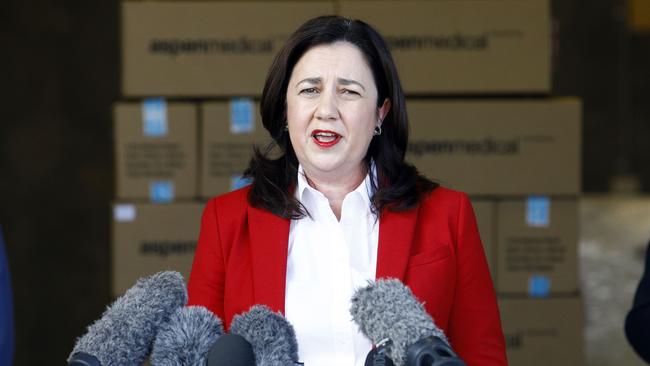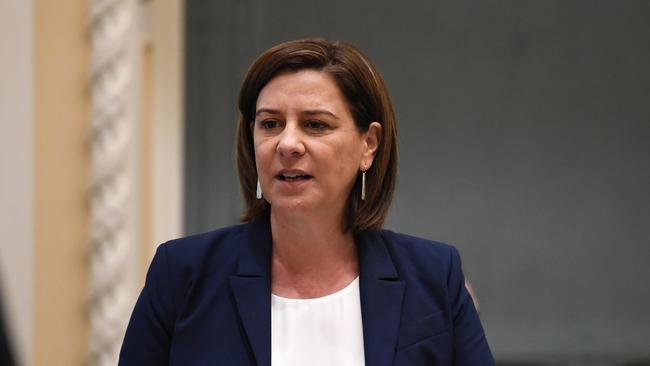Huge amount at stake at state election for Labor, and LNP
There’s a huge amount at stake at the October 31 state election. But not just for Annastacia Palaszczuk, who just a few months ago looked to be in a winning position. A loss for the Opposition would have serious implications for the future of the LNP, writes Paul Williams.
There’s been something of a sea change in Queensland politics these past couple of weeks.
As recently as July, a Newspoll told us that, while Labor’s primary vote was moving down and the LNP’s up, the after-preference vote was pretty much line-ball. Add that to the stellar approval ratings Premier Annastacia Palaszczuk was then enjoying, and it looked like Labor would again scrape home.
Qld Premier Annastacia Palaszczuk prepared to lose election before opening borders
Latest polling shows Labor expected to win election but not enough voters will back them
Why? Because Queenslanders traditionally rate leadership extremely highly in their vote choice. And with Palaszczuk in July enjoying a 64 per cent approval rating, a 57 per cent “better premier” mark, and an 81 per cent approval of her management of the COVID-19 crisis, Labor strategists have long been quietly confident.
How quickly circumstances can change.

A more recent YouGov poll has now pegged Labor’s primary vote at just 32 per cent, and the LNP’s at 38 per cent. Given that preferences from One Nation, United Australia and Katter’s Australian Party look like replicating the 2019 federal election and breaking very generously to the LNP, YouGov’s forecast of an after-preference vote of 56 per cent in the LNP’s favour might not be so far-fetched.
If true, the LNP would secure around 20 seats in a 7 per cent swing. Worse still for Labor, YouGov revealed almost half of all Queenslanders expect the Government to be returned. That might just see a critical mass of swinging voters sufficiently conformable to lodge a protest vote in the false belief others will re-elect Labor.
A similar sentiment unexpectedly rebuffed the Goss Labor government in 1995.
That’s why, when the history of Queensland’s 2020 election is written, one view of any Labor loss will invariably be how voters ultimately looked beyond the current COVID-19 challenge and toward a post-pandemic future where small business and jobs matter most.
That may well be true. But history so often unfolds not in smooth and gentle waves, but in sharp and rapid jolts.
That’s why I suspect voters are doing more than looking over the horizon and are, instead, responding to a series of recent regrettable events.
The first occurred in late August when an unborn baby – one of twins – died when a Ballina mother was routed to a Sydney hospital before coming to Queensland. It’s the kind of heart-wrenching tragedy that can make any supporter of border closures question the policy.

A second watershed occurred when media and voters expressed anger over what appears to be a double standard in border exemptions. Where’s the justice, critics asked, in allowing “Hollywood celebrities” and AFL players into Queensland but not ordinary Australians?
And that dovetailed into a third event when a nurse from Canberra – a city apparently clear of COVID-19 but off-limits to Queensland – was denied the opportunity to attend her father’s funeral.
When we throw in condemnation from Scott Morrison (always popular in Queensland) and other federal and state conservatives, it soon appears – rightly or wrongly – that Palaszczuk has lost touch with ordinary Queenslanders, is politically exploiting the pandemic or, worst of all, just doesn’t care.
Either way, we’re now seeing the Palaszczuk Government lose control of both its political and media agenda. Labor strategists are undoubtedly aware of this, and that’s why, on Monday, we heard the Premier’s strongest words yet: that she is prepared to lose the election rather than put Queenslanders’ health at risk.
That line is designed to tap into two pillars of Queensland political culture: our preference for a ‘strong’ leader resolute in their decisions, and a defence of Queensland’s own interests against southern ‘aliens’.
But the Premier’s rhetoric appears to be failing, and this election is fast becoming one for the LNP to lose. That means, with each passing day, the spotlight will increasingly fall on the LNP as next likely government, and Deb Frecklington as the next likely premier.
That also means the LNP must shift from its current guerrilla tactics of ‘attack and run’ to one of outlining a full suite of costed policies – more than diverting rivers and ‘boot camps’ for wayward youths – that exclude asset privatisation and the reduction of frontline public services: two things most voters hate.
So what happens should the LNP lose an ‘unlosable’ election? A third successive defeat for a party that has been in office for just five of the past 31 years will almost certainly see the LNP – like its predecessor the CPNP in 1936 – dissolve back into separate Liberal and National parties.
Yes, there’s a lot at stake on October 31.
Dr Paul Williams is a senior lecturer at Griffith University
